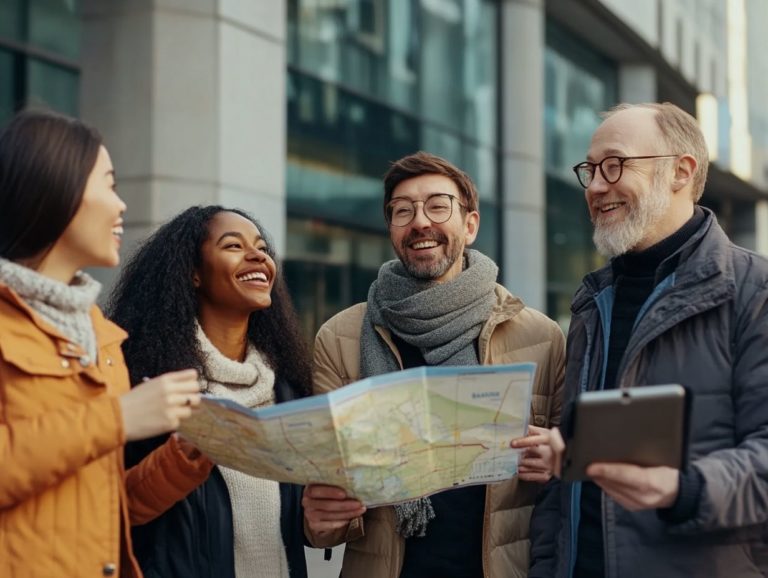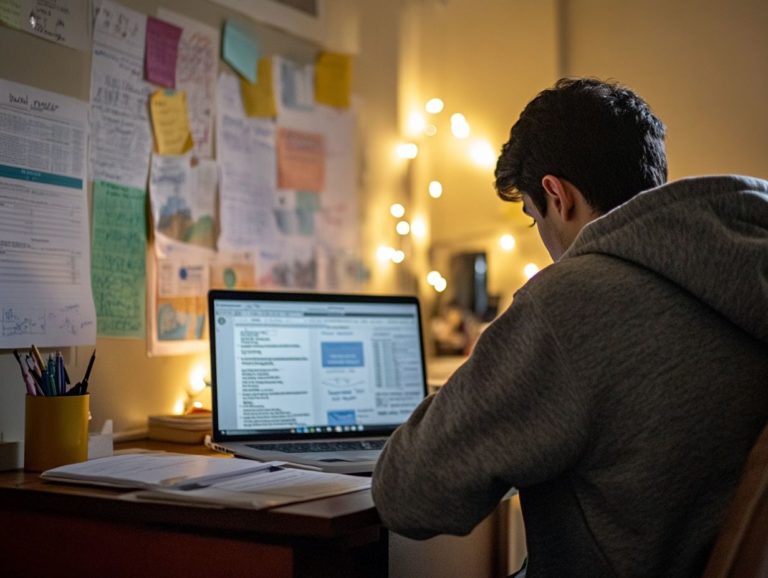How to Stay Safe While Studying Abroad?
Studying abroad presents a remarkable opportunity for personal and academic growth, yet it also brings its share of challenges. Get ready for an adventure that will change your life!
From immersing yourself in a new culture to addressing safety concerns, preparation is crucial. This guide will cover the essential aspects of studying in a foreign country, including vital documents, safety tips, and emergency procedures.
It will also explore effective ways to keep in touch with family and friends as you embark on this thrilling adventure.
Contents
- Key Takeaways:
- Benefits of Studying Abroad
- Preparing for Your Trip
- Conclusion
- Staying Safe While Abroad
- Dealing with Emergencies
- Maintaining Communication with Family and Friends
- Frequently Asked Questions
- How can I stay safe while studying abroad?
- What are some common safety concerns for students studying abroad?
- What should I do if I feel unsafe while studying abroad?
- How can I prepare for emergencies while studying abroad?
- What are some tips for staying safe while traveling in a foreign country?
- What should I know about local laws and customs while studying abroad?
Key Takeaways:
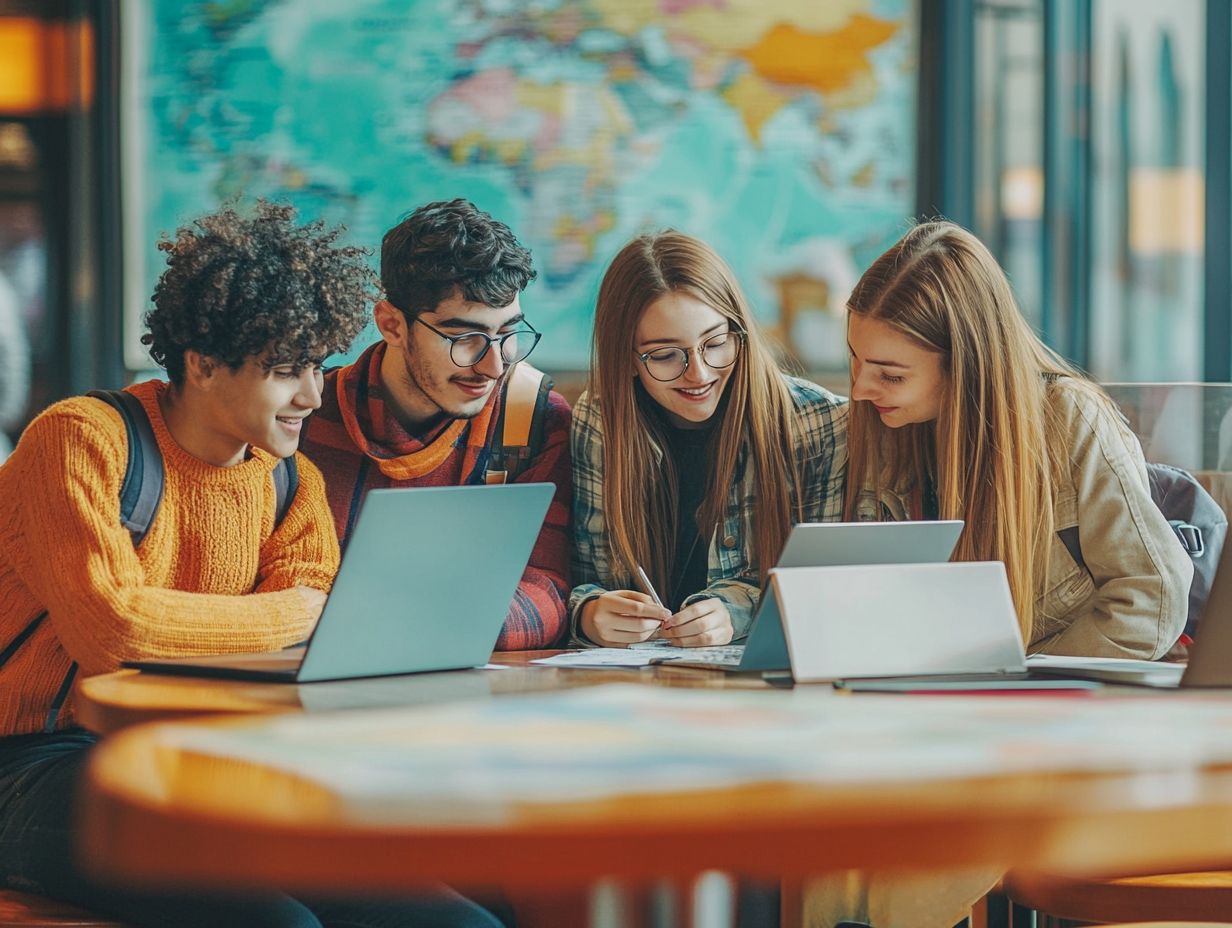
- Research and prepare before your trip to ensure a safe and enjoyable experience studying abroad.
- Stay aware of potential safety concerns in your host country and follow general safety tips.
- Act now to create your emergency plan before you leave!
Benefits of Studying Abroad
Studying abroad presents an array of advantages that transcend mere academics. It grants you the chance to immerse yourself in diverse cultures and cultivate essential life skills.
This distinctive experience deepens your understanding of the world, enhances your adaptability, and prepares you for future challenges in both your career and personal life.
As an international student, you ll likely return with refined intercultural communication skills and a broader perspective on global issues. This journey becomes not just a pivotal educational opportunity but a transformative life experience.
Cultural Immersion and Personal Growth
Cultural immersion is a remarkable aspect of studying abroad that fosters profound personal growth and a deeper understanding of local customs. When you find yourself living in a foreign country, you re often compelled to engage fully with your surroundings.
Participating in local traditions, whether it’s attending vibrant festivals or joining culinary workshops, allows you to learn about diverse practices and forge meaningful connections with residents. Such experiences challenge you to adapt to new environments, nurturing resilience and flexibility.
Gaining insights into cultural norms like communication styles or the significance of certain gestures heightens your awareness and enriches your experience. This deeper understanding ultimately shapes your worldview and enhances your empathy.
Preparing for Your Trip
Preparing for your study abroad trip demands careful planning to guarantee a seamless and secure experience. You’ll need to gather essential documents like your passport and visa.
Secure comprehensive travel insurance and ensure you ve received any necessary vaccinations. Conduct detailed research on your destination. Understanding local laws, health risks, and cultural norms will enhance your journey.
Important Documents and Vaccinations
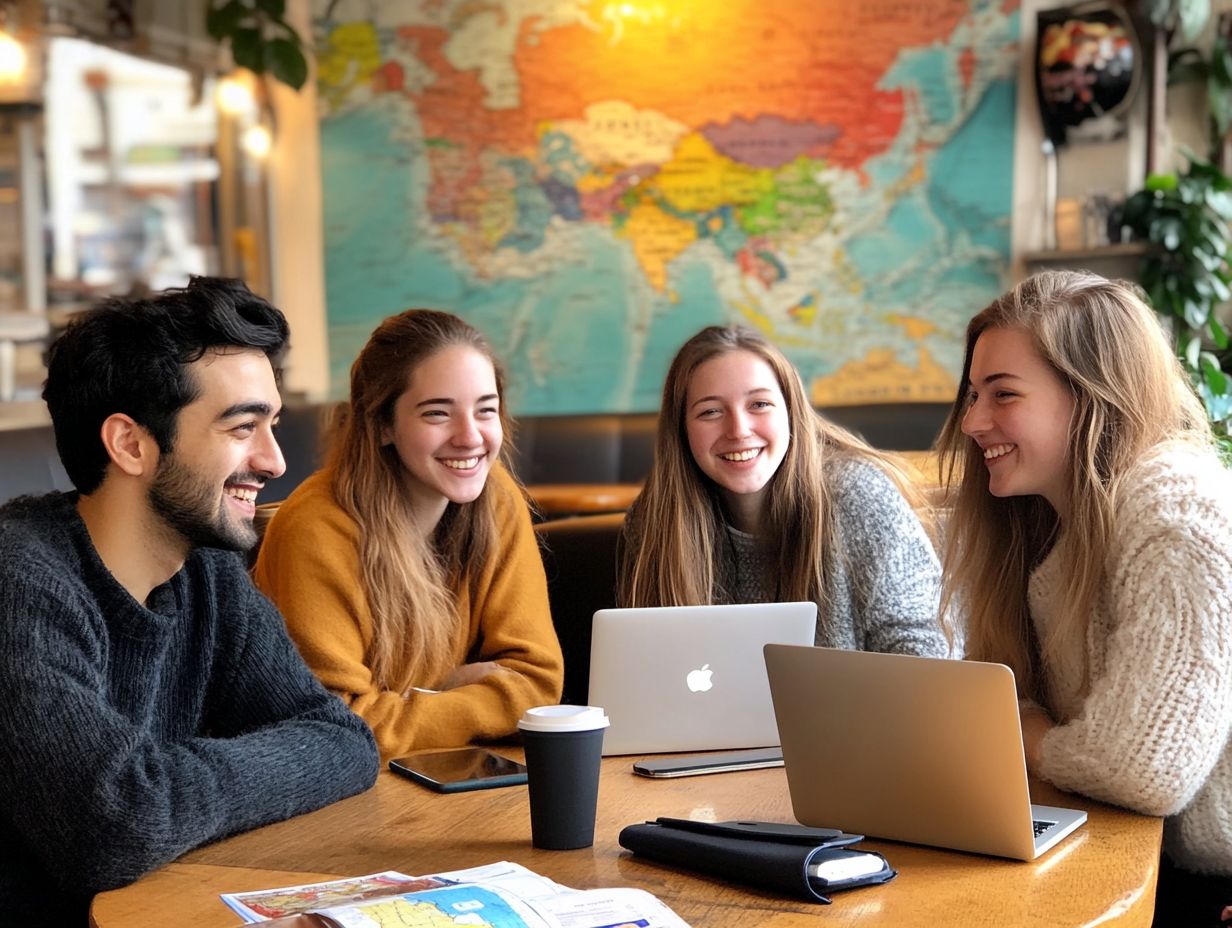
Gathering important documents and ensuring you have the proper vaccinations are important steps in preparing for your international study experience. Start by collecting essential paperwork, including a valid passport and any necessary visas for your destination.
It s wise to have your health insurance documents readily available, clearly outlining your coverage for medical services while abroad. Vaccination requirements can vary, so check which immunizations you ll need to avoid potential health issues.
Additionally, having travel insurance is vital. It protects you from unforeseen circumstances, ensuring your well-being as you adapt to new environments.
Conclusion
Studying abroad is an enriching experience filled with opportunities for growth, learning, and adventure. By preparing carefully and staying informed, you can make the most of your journey and create lasting memories.
Staying Safe While Abroad
Ensuring your safety while studying abroad is crucial. Be mindful of your surroundings and embrace a range of safety tips for students abroad to minimize potential risks.
Familiarize yourself with local laws, crime statistics, and cultural norms to enhance your personal safety and contribute to a secure experience. Make it a priority to know your emergency contacts, invest in travel insurance, and locate nearby police stations.
These resources empower you to navigate unexpected situations with confidence and ease.
General Safety Tips
General safety tips are vital for you as an international student, ensuring a secure and fulfilling experience while studying abroad. To enhance your safety, consider learning how to stay safe while traveling alone and stay aware of your surroundings at all times.
Safe travels start with selecting the right public transportation. Choose options that are reputable and frequently used. Stay alert! Being watchful for any unusual behavior nearby can significantly enhance your personal safety.
Avoid interactions with suspicious individuals to foster a sense of security. Caution around alcohol consumption, especially in unfamiliar environments, is essential to prevent potentially dangerous situations.
By combining awareness of your surroundings with these smart practices, you can create a safer atmosphere for yourself, enriching your study experience while abroad.
Specific Safety Concerns in Different Countries
Safety concerns can differ greatly from one country to another. It s essential for you to familiarize yourself with local laws and crime statistics.
Recognize that certain areas may have heightened crime risks. For example, be cautious of pickpocketing in bustling tourist spots or more serious offenses in neighborhoods with less police presence. Staying aware of these factors is key to maintaining your personal safety.
Health insurance requirements can vary significantly; ensure you have adequate coverage for any medical emergencies that might arise during your stay.
Cultural norms play a significant role in safety too. In some countries, local customs such as dress codes or acceptable public behavior can affect how safe you feel.
Keep up with travel warnings issued by governments to steer clear of potentially dangerous locations, giving you peace of mind as you navigate and immerse yourself in new cultures.
Dealing with Emergencies
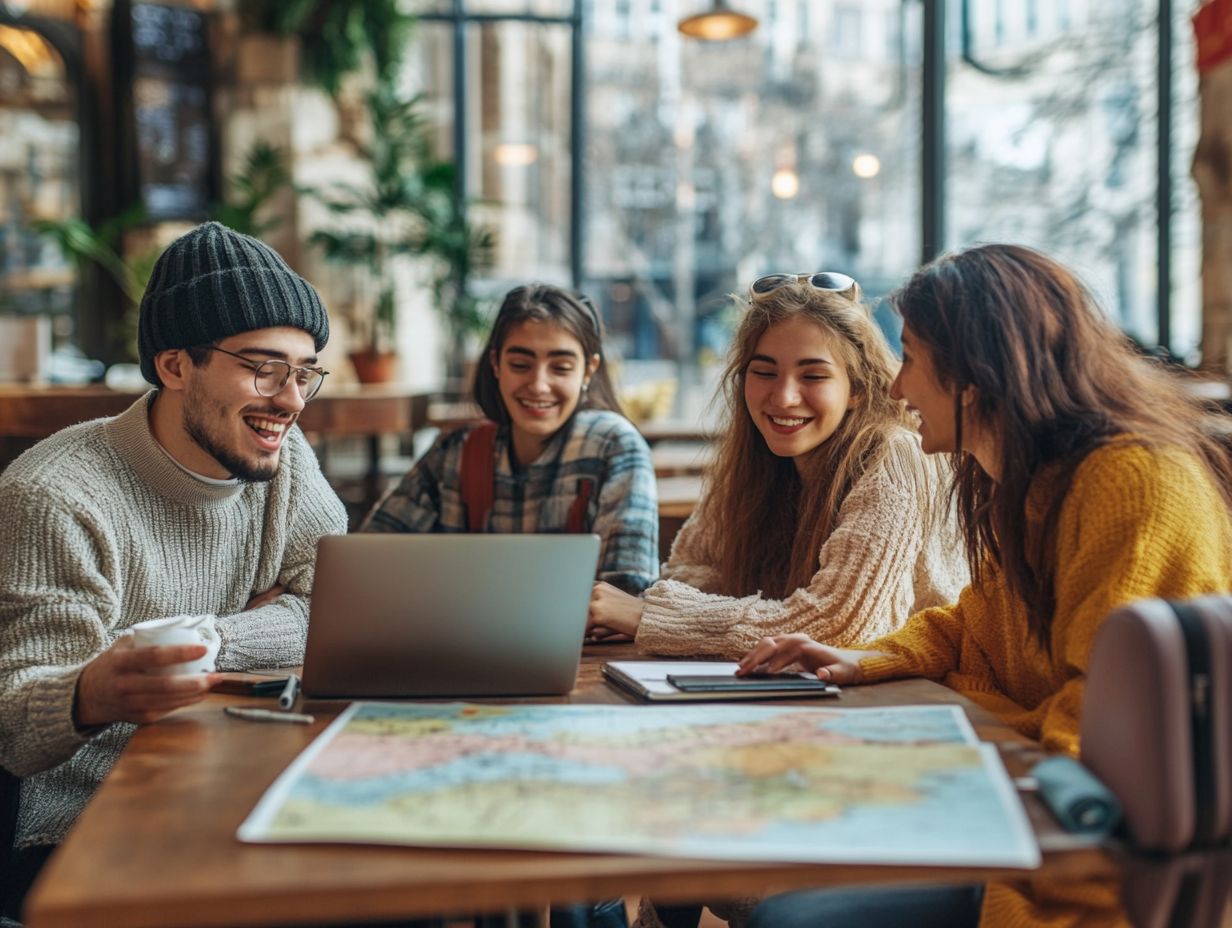
Navigating emergencies while studying abroad requires preparedness and an understanding of crucial emergency contacts and procedures. Be sure to familiarize yourself with local emergency numbers, the locations of U.S. embassies, and how to reach local police for assistance.
Having this information at your fingertips can significantly reduce panic during unexpected situations and enhance your ability to seek help swiftly and effectively.
Emergency Contact Information and Procedures
Having emergency contact information and procedures in place is essential for you as an international student to navigate crises effectively.
To start, compile a comprehensive list of local emergency numbers, including those for fire, medical, and police services. This may involve visiting local government websites or reaching out to student services at your institution for guidance.
Maintain the contact details of the U.S. embassy, as they can provide vital support in emergencies abroad. You can find information about the nearest embassy online, ensuring you have the phone number and address readily available.
Be aware of the local police contact, especially for situations requiring immediate assistance. Understanding the appropriate procedures for various emergencies whether it s a natural disaster, medical issue, or personal safety concern can significantly enhance your ability to respond calmly and efficiently when needed.
Maintaining Communication with Family and Friends
Staying connected with family and friends while studying abroad is crucial for your emotional well-being and safety. Use modern communication tools and social media to keep in touch effortlessly.
This connection fosters a sense of security and lets you share your experiences. Establish a routine for check-ins to enhance safety and avoid feeling isolated in a new environment.
Ways to Stay Connected and Safe
International students can use several effective strategies to stay connected and safe abroad. Apps like WhatsApp and Zoom help you maintain regular conversations, making the distance feel smaller.
Social media platforms like Instagram and Facebook allow you to share your experiences and feel part of a community. Schedule a weekly video call to keep your loved ones updated on your journey.
Stay aware of your surroundings too. Share your location with trusted contacts while exploring new areas to balance social connectivity with personal safety.
Frequently Asked Questions

How can I stay safe while studying abroad?
Stay safe by being aware of your surroundings, taking necessary precautions, and following local laws and customs.
What are some common safety concerns for students studying abroad?
Common safety concerns include theft, health issues, natural disasters, and cultural differences.
What should I do if I feel unsafe while studying abroad?
If you feel unsafe, contact your program coordinator or local authorities immediately. It’s better to be cautious.
How can I prepare for emergencies while studying abroad?
Have an emergency plan that includes important contacts, the nearest embassy or consulate, and knowledge of emergency protocols in your host country.
What are some tips for staying safe while traveling in a foreign country?
Avoid traveling alone at night, keep important documents secure, and be aware of scams and pickpocketing techniques.
What should I know about local laws and customs while studying abroad?
Research local laws and customs to avoid legal issues and respect the culture of your host country.


